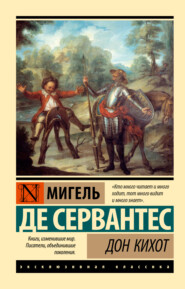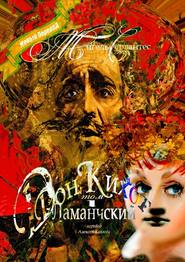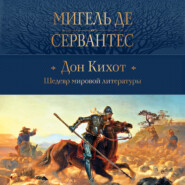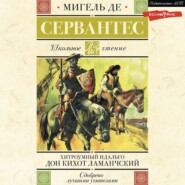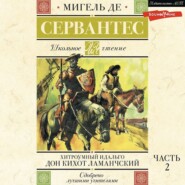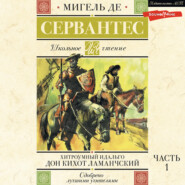По всем вопросам обращайтесь на: info@litportal.ru
(©) 2003-2025.
✖
The History of Don Quixote, Volume 2, Part 22
Настройки чтения
Размер шрифта
Высота строк
Поля
"Blessed be God," said Don Quixote when he had heard Don Lorenzo's sonnet, "that among the hosts there are of irritable poets I have found one consummate one, which, senor, the art of this sonnet proves to me that you are!"
For four days was Don Quixote most sumptuously entertained in Don Diego's house, at the end of which time he asked his permission to depart, telling him he thanked him for the kindness and hospitality he had received in his house, but that, as it did not become knights-errant to give themselves up for long to idleness and luxury, he was anxious to fulfill the duties of his calling in seeking adventures, of which he was informed there was an abundance in that neighbourhood, where he hoped to employ his time until the day came round for the jousts at Saragossa, for that was his proper destination; and that, first of all, he meant to enter the cave of Montesinos, of which so many marvellous things were reported all through the country, and at the same time to investigate and explore the origin and true source of the seven lakes commonly called the lakes of Ruidera.
Don Diego and his son commended his laudable resolution, and bade him furnish himself with all he wanted from their house and belongings, as they would most gladly be of service to him; which, indeed, his personal worth and his honourable profession made incumbent upon them.
The day of his departure came at length, as welcome to Don Quixote as it was sad and sorrowful to Sancho Panza, who was very well satisfied with the abundance of Don Diego's house, and objected to return to the starvation of the woods and wilds and the short-commons of his ill-stocked alforjas; these, however, he filled and packed with what he considered needful. On taking leave, Don Quixote said to Don Lorenzo, "I know not whether I have told you already, but if I have I tell you once more, that if you wish to spare yourself fatigue and toil in reaching the inaccessible summit of the temple of fame, you have nothing to do but to turn aside out of the somewhat narrow path of poetry and take the still narrower one of knight-errantry, wide enough, however, to make you an emperor in the twinkling of an eye."
In this speech Don Quixote wound up the evidence of his madness, but still better in what he added when he said, "God knows, I would gladly take Don Lorenzo with me to teach him how to spare the humble, and trample the proud under foot, virtues that are part and parcel of the profession I belong to; but since his tender age does not allow of it, nor his praiseworthy pursuits permit it, I will simply content myself with impressing it upon your worship that you will become famous as a poet if you are guided by the opinion of others rather than by your own; because no fathers or mothers ever think their own children ill-favoured, and this sort of deception prevails still more strongly in the case of the children of the brain."
Both father and son were amazed afresh at the strange medley Don Quixote talked, at one moment sense, at another nonsense, and at the pertinacity and persistence he displayed in going through thick and thin in quest of his unlucky adventures, which he made the end and aim of his desires. There was a renewal of offers of service and civilities, and then, with the gracious permission of the lady of the castle, they took their departure, Don Quixote on Rocinante, and Sancho on Dapple.






